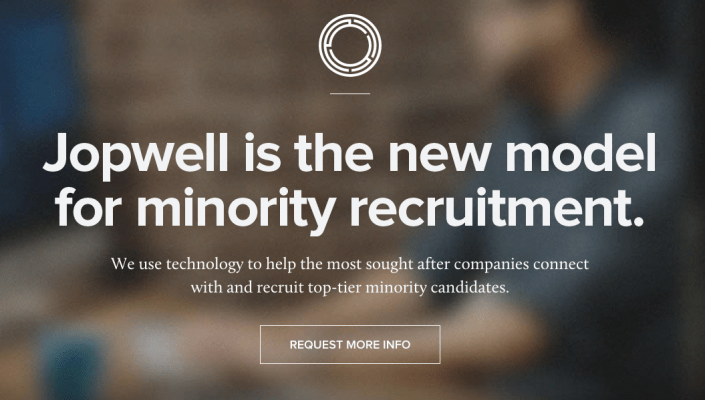Behind the repetitive and apologetic acknowledgment that there is a lot more “work to do” on diversity at companies like Facebook, Google and Twitter is the idea that there isn’t a sufficiently large enough “pipeline” of minority candidates that are qualified to take these jobs.
A Y Combinator company called Jopwell is taking aim straight at the “pipeline” question.
They’re building a recruiting platform that allows employers like Pinterest to connect with black, Latino and Native American candidates from colleges across the country. Job seekers, who must have a college degree in any discipline, can sign up and create a detailed profile and express interest in specific companies. On the other side, Jopwell’s partners can search for candidates with specific qualifications.
CEO Porter Braswell said that corporate diversity initiatives usually rely on partnerships with nonprofits that can only handle small-scale amounts of hiring.
“They haven’t really changed their model since the Civil Rights Era,” said Braswell, who previously worked at Goldman Sachs. “We took a business mentality and formed a startup to look at a traditional non-profit space.”
At the same time, Braswell argued that tech companies don’t really know how to reach out to minority candidates.
For about five years, Google and other tech companies like Yahoo, Oracle and Applied Materials resisted the requests of San Jose Mercury News reporter Mike Swift to release Equal Employment Opportunity Commission data on the racial make-up of their workforce, saying it was a “trade secret.”
But after getting heat from both the media and civil rights organizations like Jesse Jackson’s Rainbow PUSH Coalition and amid internal pressure from its own workforce, the company finally released its data in May of last year in a post called “Getting to work on diversity at Google.” That opened the floodgates for many other companies like Facebook, Pinterest and Twitter to do the same, and the issue of the industry’s persistent racial exclusivity among whites and Asian-Americans exploded into broader mass media.
A year later, not much has changed in the data. Mother Jones calculated earlier this month that all of the black employees of Facebook, Google and Twitter could fit onto a single jumbo jet.
But companies are putting new policies in place. Facebook is implementing the equivalent of a Rooney Rule, by requiring recruiters to at least consider a minority candidate.
“It’s just a lack of exposure,” Braswell said. “There are good candidates out there, but the problem is that a lot of companies don’t know how to market the breadth of available roles. While there might not be enough people with STEM backgrounds, what about compliance, legal or finance? They have a difficult time letting people know that they can do business development or marketing.”
Others have argued that a pipeline exists, but that tech companies aren’t working hard enough to take advantage of what’s already there and are instead deflecting blame to the larger systemic problems of access to equal quality schools and neighborhoods.
In a study last year, USA Today reporter Jessica Guynn found that while 5 percent of tech workers at seven Silicon Valley companies were either black or Latino, 11 percent of graduates from computer science bachelor’s degree programs came from those backgrounds. She said that top tech companies were only hiring minorities at half the rate that computer science schools were producing them.
So Jopwell is hoping to raise these and other non-technical candidates to the surface. The company sources its candidates from on-campus partnerships with minority-affiliated clubs like black business associations and the National Society of Black Engineers and the alumni networks of Teach for America.
They’re open to all colleges, not just elite schools, and already have candidates from more than 200 schools across the country. “Our pipeline is incredibly diverse across many spectrums including income,” Braswell said.
For now they focus on Black, Latino or Native American candidates. “We will expand our definition of diversity over time,” Braswell said.
On the employer side, they’ve partnered with 24 companies, including AppNexus, BuzzFeed, Etsy, Facebook, McKinsey, Morgan Stanley, Pinterest and Square. They have a flexible fee structure that ranges from a subscription model to something that resembles recruiting fees for placement. So far, the company says it’s been able to place 20 candidates in either full-time or internship positions.
Jopwell has raised $1 million from angel investors along with Rothenberg Ventures.
